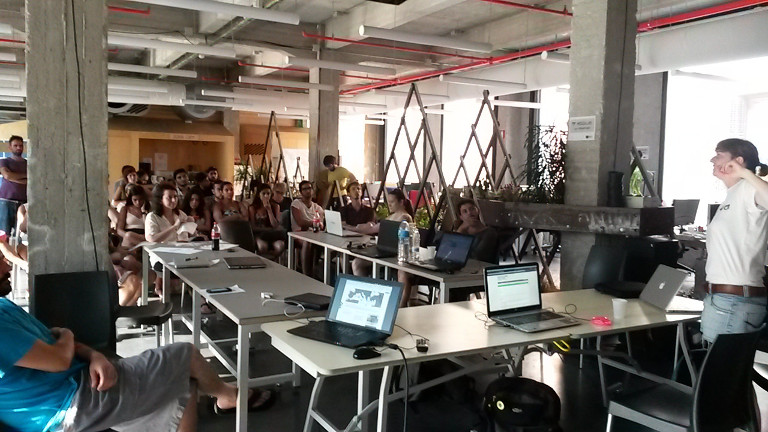Public Space Uses and Hacks: tools for collective maps of unforeseen actions
Location: LAB at Medialab Prado
A debate on boundaries that apply to the use of public space in relation to initiatives based on developing tools and communal spaces for unforeseen actions and for the expression of citizen demands.
Introduction
“All citizens have the obligation to use the city’s public spaces, services, facilities, and urban furniture, and other elements, correctly and in accordance with their nature, intention and purpose, always respecting the rights of other citizens to use and enjoy them.”
Paragraphs like these can be found in the municipal by-laws of any of our cities. This particular one is taken from the Barcelona municipal by-laws. Nonetheless, the idea that there is a “correct” way to use public space is not in line with real urban practices, or habitual ways of living in the city, or with the needs of different groups, individuals, moments in time, situations…
Language is not innocent, and the idea of a supposedly “correct” use of public space gives rise to a long list of unforeseen actions that citizens engage in and that could potentially lead to sanctions. The phrasing also reflects the increasing standardisation and privatisation of common spaces. But in response to these same boundaries, many initiatives try to go beyond the limits, to provide tools for the collaborative construction of shared gathering places and to create environments in which to support and sustain legitimate claims.

PublicSpace.Tools
PublicSpace.Tools is a tool developed by Straddle3 (Barcelona) to promote citizen empowerment for critical, creative, or unconventional uses of public space.
PublicSpace.Tools is a multilingual online platform that is still in development stage. It consists of two elements: 1) an interactive platform based on open source software that includes a map of posts created by users, with information on legal regulations pertaining to public space, good practices, recipes and tips, the reporting of abuses, etcetera; 2) a mobile application linked to a geolocalisation interface that allows users to publish content in real time.

P2P Plazas
P2P Plazas, a Southern European Network, is a research project carried out by Carmen Lozano Bright (Madrid), that is presented in tandem with PublicSpace.Tools at MediaLab. P2P Plazas was presented at MediaLab on 7 April 2015 as part of Open Conversation: Maps of the Commons in Public Space. The project now returns to MediaLab to present some of the common characteristics found in the study of three different spaces: Patio Maravillas (Madrid), La Casa Invisible (Malaga) and Navarinou park (Athens) with the aim of defining certain tools that can be useful for connecting community spaces which are cared for and self-managed by users.

The objectives of the MediaLab workshop are:
– To contextualise PublicSpace.Tools within the concept of the right to the city, in relation to specific matters regarding public space in different European cities.
– To analyse the legal conditions that apply to public space, and how to deal with them when planning and implementing unconventional activities.
– To provide basic technical and conceptual information to participants, allowing them to appropriate the tool and use it for their own objectives.
– To explore the possibilities for interaction between the platform PublicSpace.Tools and the P2P Plazas research project.




